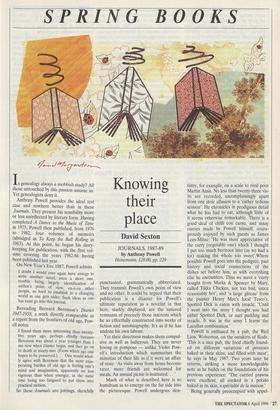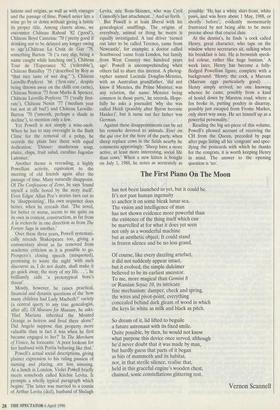SPRING BOOKS
Knowing their place
David Sexton
JOURNALS, 1987-89 by Anthony Powell Heinemann, £20.00, pp. 228 Is genealogy always a snobbish study? All those untouched by this passion assume so. Yet genealogists deny it.
Anthony Powell provides the ideal test case and nowhere better than in these Journals. They present his sensibility more or less uninflected by literary form. Having completed A Dance to the Music of Tirne On New Year's Eve 1987, Powell admits
I doubt I would ever again have energy to write another novel, even a short one, trouble being largely identification of author's point of view, vis-à-vis other people, so hard to establish in a changing world as one gets older. Such ideas as one has must go into this journal.
Rereading Bernard Berenson's Diaries 1947-1958, a work directly comparable as a report from the frontiers of old age, Pow- ell notes:
I found them more interesting than twenty- five years ago, perhaps chiefly because Berenson was about a year younger than I am now when Diaries begin, and they go on to death at ninety-two. (From which age one hopes to be preserved.). . . One would whol- ly agree with Berenson that the most exas- perating burden of old age is feeling one's mind and imagination, apparently no less vigorous than when younger, at the same time being too fatigued to put them into practical motion.
So these Journals are jottings, sketchily punctuated, grammatically abbreviated. They transmit Powell's own point of view and no other. It could be argued that their publication is a disaster for Powell's ultimate reputation as a novelist in that here, starkly displayed, are the tattered remnants of precisely those interests which he so effortfully constructed into works of fiction and autobiography. It's as if he has undone his own labour.
Yet their directness makes them compul- sive as well as ludicrous. They are never boring or pompous — unlike Violet Pow- ell's introduction which summarises the minutiae of their life as if it were an affair of state: 'As visits away from home become rarer, more friends are welcomed for meals. An annual picnic is instituted. . . ' Much of what is described here is so humdrum as to emerge on the far side into the picturesque. Powell undergoes den- tistry, for example, on a scale to rival poor Martin Amis. No less than twenty-three vis- its are recorded, uncomplainingly apart from one stoic allusion to a 'rather tedious session'. He chronicles in prodigious detail what he has had to eat, although little of it seems otherwise remarkable. There is a good deal of chilli con carne, and many curries made by Powell himself, coura- geously enjoyed by such guests as James Lees-Milne: 'He was most appreciative of the curry (vegetable one) which I thought I put too much beetroot into (as we had a lot) making the whole too sweet'.Where possible Powell goes into the pedigree, past history and social connections of the dishes set before him, as with everything else he encounters. Thus we meet a 'curly bought from Marks & Spencer by Mary, called Tikka Chicken, not too bad, sauce reasonably hot', and 'a large gateau' from the painter Henry Mee's local Tesco's. Spotted Dick is eaten with treacle. 'Until I went into the army I thought you had either Spotted Dick, or suet pudding and treacle. It was in the army I learnt the Lucullan combination.'
Powell is enthused by a pub, the Red Lion, Wolverton, on the outskirts of Rode. `This is a nice pub, the food chiefly found- ed on different variations of potatoes baked in their skins, and filled with meat', he says in May 1987. Two years later he returns, striking a more knowledgeable note as he builds on the foundations of his previous experience: 'The curried prawns were excellent, all cooked in a potato baked in its skin, a specialite de la maison.'
Being generally preoccupied with appel- lations and origins, as well as with vintages and the passage of time, Powell never lets a wine go by or down without giving a bottle its proper title. Among clarets alone, we encounter Chateau Rahoul '82 (`good'), Château Boyd Cantenac '70 (`pretty good if drinking not to be delayed any longer owing to age'),Chateau La Croix de Gay '78, something Barton '76 Ca rare slip, being a name caught while lunching out'), Château Tour de l'Esperance '82 (`tolerable'), Château Batailley '75 (`described by Roy as "that nice taste of wet dog." '), Château Leoville-Poyferre '66 (`first-rate', despite being thrown away on the chilli con carne), Château Notton '73 from Marks & Spencer, Château Leoville-Poyferre '75 (`really first- rate'), Château Nenin '77 (`medium year but not at all bad') and Château Leoville- Barton '70 (`smooth, perhaps a shade in decline'), to mention only a few.
Yet Powell is not simply a wine-snob. When he has to stay overnight in the Bath Clinic for the removal of a polyp, he records the plain fare there with equal dedication: 'Dinner: mushroom soup, plaice, chips, fruit salad, carafino Jugoslav Lutomer.'
Another theme is rereading, a highly Powellian activity, equivalent to the meeting of old friends again after the passage of time. Many naturally disappoint. Of The Confessions of Zeno, he says 'found myself a trifle bored by the story itself. Even Edgar Allan Poe's stories turn out to be 'disappointing'. His own sequence does better, when he rereads that. 'The novel, for better or worse, seems to me quite on its own in content, construction, as far from A la recherche in one direction as from The Forsyte Saga in another.'
Over these three years, Powell systemati- cally rereads Shakespeare too, giving a commentary about as far removed from academic criticism as it is possible to go. Prospero's closing speech (misquoted), promising to waste the night 'with such discourse as, I do not doubt, shall make it go quick away; the story of my life. . . ', he brilliantly calls 'a prototypical bore's threat'.
Mostly, however, he raises practical, financial and dynastic questions of the 'how many children had Lady Macbeth?' variety (a central query to any true genealogist, after all). Of Measure for Measure, he asks: `Had Mariana inherited the Moated Grange as heiress and lived there alone? Did Angelo suppose that property more valuable than in fact it was when he first became engaged to her?' In The Merchant of Venice, he forecasts: 'A poor lookout for her husband with Portia behaving like that.'
Powell's actual social descriptions, giving plainer expression to his ruling passion of naming and placing, are less amusing. At a lunch in London, Violet Polkell briefly meets somebody called Kitchie Levita. It prompts a wholly typical paragraph which begins: 'The latter was married to a cousin of Arthur Levita (dcd), husband of Shelagh Levita, née Ross-Skinner, who was Cyril Connolly's last attachment...' And so forth.
But Powell is at least liberal with his genealogical snufflings. The origins of everybody, animal or thing he meets is equally investigated. A taxi driver 'turned out later to be called Terence, came from Newcastle', for example; a doctor called Southwood 'came from London, but family from West Country two hundred years ago'. Powell is uncomprehending when others fail to share this interest. A photog- rapher named Lucinda Douglas-Menzies, with an Australian grandfather, 'did not know if Menzies, the Prime Minister, was any relation, the name Menzies being common in those parts,' he records. Hope- fully he asks a journalist 'why she was called Heidi (possibly after Byron heroine Haidee)', but it turns out her father was German.
Against these disappointments can be set his remarks devoted to animals. Ever on the qui vive for the bore of the party, when sheep replace cows in the fields nearby he comments approvingly: 'Sheep have a more active, at least more interesting, social life than cows.' When a new kitten is bought on July 1, 1988, he notes as accurately as possible: 'He has a white shirt-front, white paws, and was born about 1 May, 1988, or shortly before', evidently momentarily frustrated by not being able to be more precise about that crucial date.
At the dentist's, he finds 'a cock called Henry, great character, who taps on the window where secretaries sit, sulking when his breakfast is late. He is brownish speck- led colour, rather like huge bantam.' A week later, Henry has become a fully- fledged Powellian figure, complete with a background: 'Henry, the cock, a Marram (Marram eggs particularly good) . . . Henry simply arrived, no one knowing whence he came, possibly from a kind of hostel down by Marston road, where a fox broke in, putting poultry in disarray, possibly just escaped from Frome Market, only short way away. He set himself up as a powerful personality.'
Reading the big set-piece of this volume, Powell's pleased account of receiving the CH from the Queen, preceded by page after page listing all his `congrats' and spec- ifying the postcards with which he thanks for the congrats, it is worth keeping Henry in mind. The answer to the opening question is 'no'.



























































 Previous page
Previous page